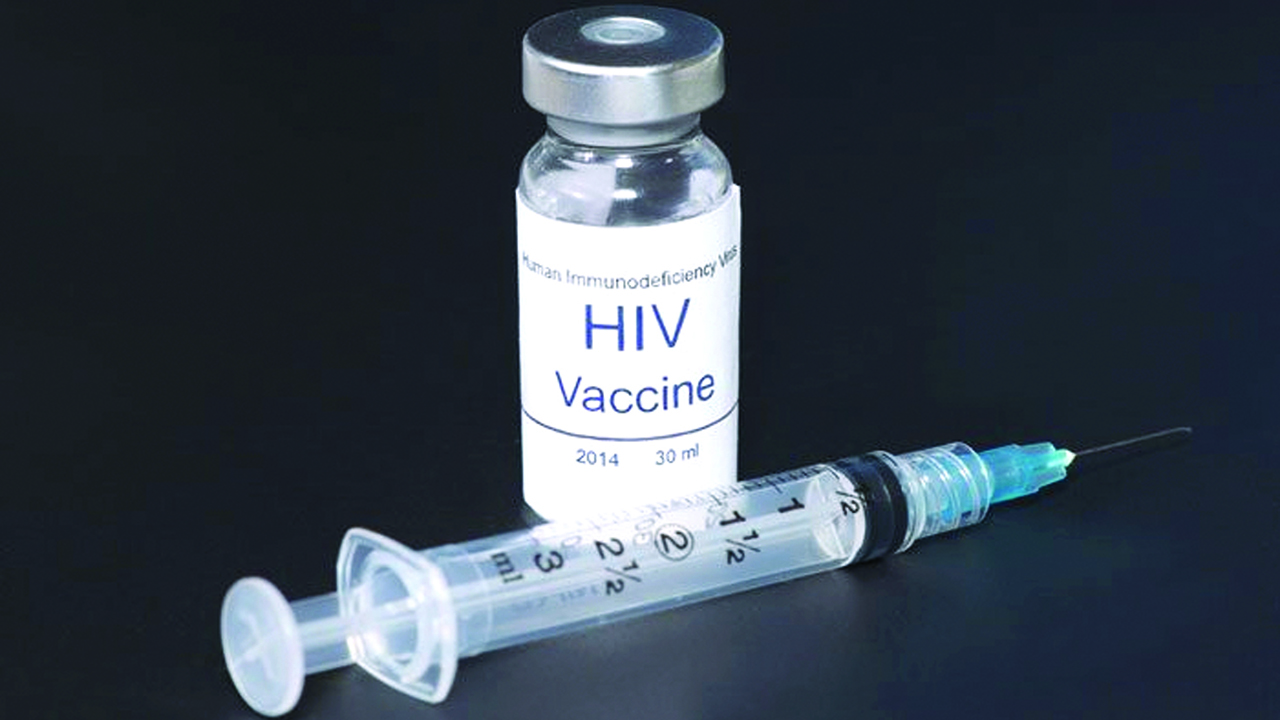
•‘I am not bothered because HIV is a different virus’, says NACA DG
•Vaccine effort has not yielded success due to antigenic changes, says NARD
•Without effective vaccine, it may be difficult to eradicate disease by 2030, says Agwale
•Lack of effective vaccine for HIV still represent public health danger, says Ojo
•HIV pandemic will not just go away by discovery of vaccine, says Idoko
Unlike COVID-19, which took less than two years for scientists to develop effective vaccines, there is yet no functional Human Immuno-deficiency Virus (HIV) jab, four decades after the first cases were documented.
Indeed, the month of June marks 40 years since the first cases of HIV/Acquired Immune Deficiency Syndrome (AIDS) were documented, in 1981. Since that time, researchers and scientists have made huge strides in HIV treatment and today it is no longer a deadly disease, but rather a manageable condition.
But unlike HIV, vaccines against COVID-19 were developed in record time and have shown remarkable levels of safety and efficacy, helping drive down caseloads countries fortunate enough to have wide access.
Many of these shots were developed using technologies that were previously tried out on HIV – so why are there no breakthroughs yet?
A virologist and vaccinologist in the area of HIV vaccine development and founder and Chief Executive Officer (CEO) of Innovative Biotech Limited, Keffi, Nassarawa State and United States, Dr. Simon Agwale, told The Guardian: “Well, everyone is bothered that after 40 years there is no effective vaccine against HIV. One of the main reasons is because of the long-lasting nature of HIV infection. Another reason is genetic variability of the virus, because an infected individual carries many variants and this is in addition to the various subtypes that exists globally. This makes the virus to evade the immune system therefore making it difficult to pin down.”
Agwale, who was unanimously elected to lead the COVID-19 vaccine task team of the African Vaccine Manufacturing Initiative, last year, said: “Money is an issue too, whereas in the case of COVID-19 the money poured in. Interestingly, the technology used by Johnson and Johnson to develop COVID-19 vaccine was first used to develop an experimental HIV vaccine, but unlike J & J that uses adenovirus 26, the first HIV vaccine candidate used adenovirus 5. Clinical trial of the HIV adenovirus 5 candidate vaccine was unfortunately halted because the participants who had pre-existing immunity, that is previously infected with adenovirus 5, were more likely to become infected with HIV.
“I think that antiretroviral drugs have helped to ameliorate the impact of HIV globally, but without an effective vaccine, it may be difficult to eradicate the disease by 2030. With the success of the COVID-19 vaccine and the different vaccine platforms that are currently in use, I believe that it is a matter of time before an effective vaccine against HIV/AIDS would be developed.”
Principal investigator of HVTN, a global organisation funding HIV vaccine development, Larry Corey, told AFP: “The human immune system does not self-cure HIV, whereas what was very clear was that the human immune system was quite capable of self-curing COVID-19.
“COVID vaccines work by eliciting antibodies that bind to the virus’ spike protein and stop it from infecting human cells. HIV also has spike-shaped proteins on its surface, which are the target of HIV vaccine development.”
But an immunologist leading the development of an mRNA HIV vaccine at Scripps Research Institute, William Schief, told AFP: “While COVID has a number of well-known variants circulating worldwide, HIV has hundreds or thousands of variants inside each infected person.
“Because it is a ‘retrovirus’ it quickly incorporates itself into its host’s DNA. An effective vaccine will need to stop the infection dead in its tracks, not just reduce the amount of virus and leave the remainder to stay with the person forever.”
Deoxyribonucleic Acid (DNA) is the genetic material.

Director General, NACA, Dr. Aliyu Gambo, told The Guardian: “… I am not bothered because HIV is a different virus. It is uniquely different from other viruses in the sense that it is one of the viruses that have the capacity to change its shelf and because of that it has deluded conventional way of developing vaccine.
“If there would be vaccine for HIV, then the way the world will take to get that vaccine will be entirely different from the way we traditionally take to get other vaccines- for polio, for COVID, for measles and all others for the simple reason that the basic thing needed to build a vaccine is unstable for HIV. So you build this vaccines today and tomorrow the vaccines will no longer be effective simply because the virus has changed and those agents of the vaccine can no longer recognise the new virus.”
Would a vaccine have made a difference? Gambo said: “Certainly, a vaccine would have made a lot of difference even if at the moment the world is able at last to come up with one, that would make a whole lot of difference especially a preventable vaccine. A vaccine that prevents people getting infected for HIV will definitely change the trajectory for HIV globally and will keep people much safer, away from having HIV than treating them when they already have the disease.”
Why is it taking so long? Is it because it is not considered a pandemic? The NACA DG said: “No! HIV is a pandemic. It has always been a pandemic from the time it was identified; it was treated as a pandemic. But the major difference is that in the case of HIV, the world was not able to find a solution to it for the last 40 years in terms of getting a vaccine or in terms of getting a cure such that when it is administered it will kill all the viruses in the body including the one that is hidden in their DNA/genetic material.”
How has Nigeria fared with antiretroviral treatment and funding? “HIV treatment globally has changed the face of the pandemic. It has changed the discuss and of course it has changed the outcome of HIV infection already globally. What am I saying? The drugs today prevents HIV from progressing to AIDS. It is usually AIDS that kill, which is advanced form of HIV. Today, the medication prevents HIV from progressing to AIDS and killing victims. So in terms of deaths, deaths have drastically reduced from HIV globally because of the drugs,” Gambo said.
He added: “In terms of people who have the disease giving it to others especially by bisexual transmission and other means, that probability has been reduced by the drugs. The drugs deny the virus to show itself in the blood and if it doesn’t show itself in the blood, it doesn’t get transmitted. These are the two good thing the drug has done to change the course of HIV disease, to make HIV only limited to those that have it, keep HIV away from people who do not have it, prevent those who have it from spreading it to give others and also prevent HIV from those who have it from progressing to AIDS and killing the victim.
“In terms of funding, the funding for HIV has been consistent and it has been very helpful. Recently, the government of Nigeria has increased funding for HIV for treatment of people that are affected with the disease. Because of that, in the last two years, Nigeria has recorded tremendous success in the fight against HIV and we are hoping with the political commitment, with the support we get from the government, HIV will be brought under control in the life of this administration.”
How far with plans to end AIDS by 2030? The NACA DG said: “This is on course especially here in Nigeria. The target is that by the year 2025 we should reach programme progress benchmark, which is the one we call epidemic control, which is to attain the joint United Nations programme on AIDS (UNAIDS) global target of 95, 95, 95. This target is what countries are expected to achieve by the year 2025. As I am talking to you, Nigeria has made tremendous success in achieving this target.
We are hoping that before the end of next year, we should arrive at the 95,95,95, three years before the expected benchmark or year for the attainment of the target.”
95-95-95 for treatment: 95 per cent of people living with HIV knowing their HIV status; 95 per cent of people who know their status on treatment; and 95 per cent of people on treatment with suppressed viral loads. Reduce the annual number of new HIV infections among adults to 200,000. Achieving zero discrimination.
A consultant public health physician and Executive Secretary, Enugu State Agency for Control of AIDS (ENSACA), Dr. Chinedu Arthur Idoko, told The Guardian: “The multisectoral response to HIV/ AIDS has a set structure that has developed overtime internationally, nationally and locally. The preventive, control and management strata of this response has had its obvious gains and challenges. HIV positive patients are able to freely access antiretroviral therapy which when they are compliant and adhere to treatment protocols are able to have their viral load suppressed to such an extent they are able to live healthily and cannot transmit the virus to their spouses/ partners; and for pregnant and breastfeeding women to their unborn children (at delivery) and new born respectively.”
Bothered by absence of HIV Vaccine? Idoko, who is a former Chairman, Enugu State Hospitals Management Board, further stated: “Yes, because discovery of an HIV vaccine is a win-win situation. No, because HIV is a multifaceted issue. When you are not infected you are one way or the other affected. It is therefore a problem that demands a multidimensional approach to its control and would not just go away by the discovery of a vaccine. Furthermore, there are already treatment options that adherence and compliance to will keep the infected safe as well as protect others.
“HIV has many types. Type 1 alone has about 60 strains. The question of the difficulty in finding an HIV vaccine therefore becomes a rhetoric. It is however important to note that the scientific world has not given up on an HIV Vaccine. It is not because HIV is not considered a pandemic, as it is one in all ramifications even though variously referred to with terms like a ‘global epidemic’.”
On funding, Idoko said there is always room for improvement. “Funding however continually remains a problem especially in this era of donor apathy. We however cannot allow a slip of the gains already made. It is important that nationally and locally HIV funding is giving a priority attention as it remains an ever present danger and cause of enormous morbidity, mortality with the attendant psychological (stigma) and mental health issues amongst our people,” he said.
Idoko, however, said the plan to end HIV/ AIDS by 2030 is in focus. “Although the advent of the COVID-19 virus has had its fair share of slowing of the HIV/ AIDS control efforts, the target has not shifted. The 90-90-90 target is progressing to the 95-95-95 target and ultimately is the grand picture of ending AIDS by the year 2030. It is achievable but demands all hands on deck,” he said.
President, National Association of Resident Doctors (NARD), Dr. Okhuaihesuyi Uyilawa, told The Guardian that HIV is a pandemic, however, vaccine effort has not yielded success due to antigenic changes and mutations just like for other diseases including malaria.
Uyilawa said the good news is that better drugs are currently available, that is, the drugs are without genetic barrier and resistance and less side effect such that people can now maintain long term virological suppression to undetected viral levels. “This has helped reduce to nearest minimum community transmission as well as mother to child transmission. For instance, in sero-discordant couples and children born by people living with HIV/AIDS,” he said.
Uyilawa said the Federal Government is yet to be ready to take over treatment as there is still heavy reliance on donor agencies. “We are currently in phase 3 of the pep-far project which targets individual country taking over treatment of citizens living with HIV/AIDS,” he said.
Uyilawa, who is a consultant orthopaedic and trauma surgeon, said Nigeria has failed in the pilot done in Taraba and Abia States where the Federal Government that was to provide such treatment drugs failed, leaving citizens to the harrowing task of travelling to other nearby states to access medications provided by foreign donor agencies.
He said the FG needs to be responsive enough to take over country-wide treatment as that is the target of the current phase.
Uyilawa said for the dream of ending AIDS to be realistic, there is a need for doubling of effort on the side of patients, healthcare providers, Federal Government and donor agencies.
He said it is achievable to end AIDS by 2030 as currently fewer people develop AIDS even in the hospitals. “Today, as a result of intervention from donor agency, management of HIV has even proven better than those of some people with hypertension or diabetes,” Uyilawa said.

Consultant pharmacist and Medical Director of MeritHealthcare, Dr. Lolu Ojo, told The Guardian: “Yes, I am bothered about lack of effective vaccine for HIV because of the public health danger it still represents 40 years after the outbreak.
“A lot of people are still carrying the burden associated with HIV and economies are still cringing under the weight of HIV/AIDS disease.
“However, we have moved substantially forward in the past four decades in terms of handling and medicines availability.”
Will a vaccine have made a difference? Ojo said: “Certainly, the vaccine could have made substantial difference just like it did with polio.
“The vaccine would have helped people to develop immunity to the virus. The number of people coming down with HIV/AIDS would have gone down significantly and resources currently being expended would have been channelled into other productive ventures.”
Why is it taking so long? “There have been many serious and dedicated efforts at making the vaccines, it just that none has come on stream yet. This may be due to the nature of the virus and seriousness of the disease that it caused. I hold a firm belief that the world will get it right some day,” Ojo said.
On how well Nigeria has fared with antiretroviral (ARV) treatment and funding, Ojo added: “So far, so good. We have received support from various international agencies and our people are getting the needed support.
“I will get worried that 40 years after, Nigeria is still lagging behind in the production of ARV drugs. Almost 50 per cent of the World’s ARV supply is from India and same is true for vaccines. When are we going to get things right in this country?”
On plans to end AIDS by 2030, Ojo said: “It is still a ‘work in progress’ for the world. Some very serious nations and groups will get it right on before the deadline, while for others, as usual, it will jus be a mere slogan.”
MEANWHILE, recent statistics indicate that a total of 38 million people are currently living with the virus to date.
Africa is leading with the highest number of those living with the disease. Out of the 38 million HIV-positive people worldwide, 25.7 million, which represents 69 per cent live in sub-Sahara Africa.
In February this year, a modelling study revealed that Africa’s ability in HIV testing and condom use is at 12.1 per cent and 28.5 per cent.
UNAIDS in 2014 launched an ambitious target to end the AIDS epidemic by 2030 by achieving 95 percent diagnosis and 95 percent of people with HIV taking medications against the disease.
More people than ever now have access to medications called antiretroviral therapy or ART, which when taken as prescribed keeps down the amount of virus in their body.
This keeps them healthy and unable to transmit HIV to their partners.
Beyond ART, people at high risk for infection can now get pre-exposure prophylaxis, or PrEP, a pill taken every day that reduces the risk of infection by 99 per cent.
Global head of viral vaccine discovery at Johnson & Johnson’s Janssen Vaccines, Hanneke Schuitemaker, told Agence France-Presse (AFP): “But access to medication is not organised in every part of the world. Even within wealthy countries, wide socioeconomic and racial disparities exist in accessing these medicines, and vaccines have historically been the most effective tools to eradicate infectious diseases.
“J&J is currently carrying out two human efficacy trials for its HIV vaccine candidate, and initial results from one of them may come as early as the end of this year.” Schuitemaker said.
Last year, a study called Uhambo that was taking place in South Africa and involved the only vaccine candidate ever shown to provide some protection against the virus frustratingly ended in failure.
J&J’s vaccine candidate is currently being trialed in 2,600 women in sub-Saharan Africa in the Imbokodo trial, which is expected to report results in the coming months.
It is also being tested in around 3,800 men who have sex with men and transgender individuals across the U.S., South America and Europe in the Mosaico trial.
The J&J vaccine uses similar adenovirus technology to its COVID-19 vaccine, in other words, a genetically modified cold virus delivers genetic cargo-carrying instructions for the host to develop “mosaic immunogens,” which are molecules capable of inducing an immune response to a wide variety of HIV strains.
This is followed up by directly injecting synthetic proteins in later doses.
Another promising approach is to try to generate “broadly neutralizing antibodies” (bnAbs) which bind to areas of the HIV virus that are common across its many variants.
The International AIDS Vaccine Initiative and Scripps Research recently announced results from an early-stage trial showing their mRNA vaccine candidate, developed with Moderna, stimulated the production of rare immune cells that create bnAbs.
Their strategy is to use a sequence of shots to try to gradually educate antibody-producing B-cells. They also hope to train up another kind of white cell, known as T-cells, to kill any cells that still get infected despite the antibodies.
Efficacy trials are still a long way off, but there is hope the mRNA technology, which turns the body’s cells into vaccine factories and has proven its worth against COVID-19, can make the difference.






